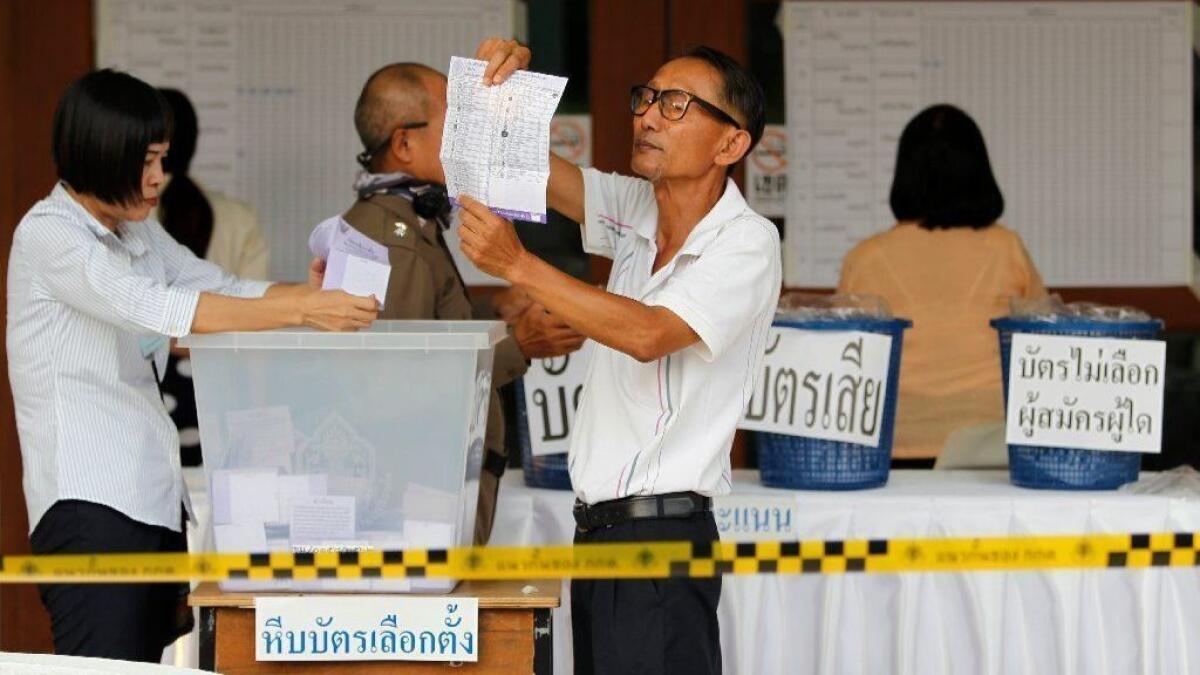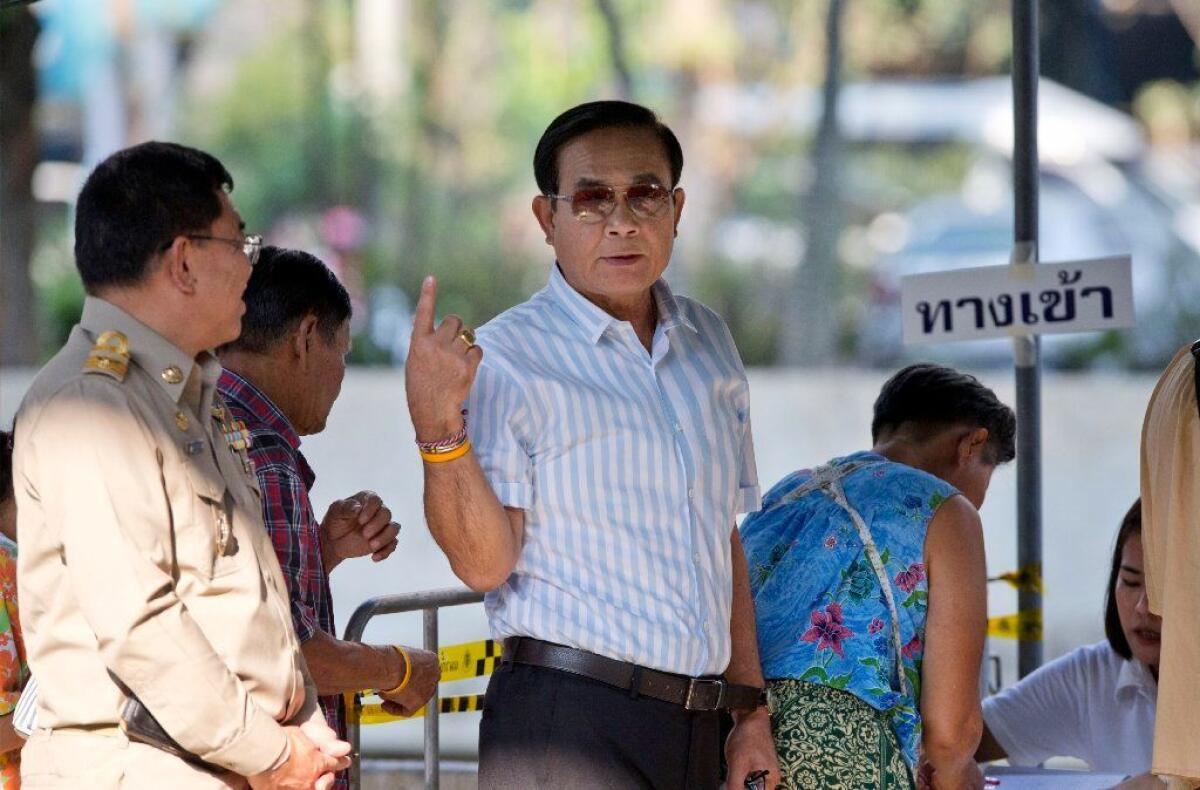Thailand’s junta leader will keep grip on power, early election returns indicate

- Share via
Reporting from Bangkok, Thailand — A party backed by Thailand’s military government had a strong showing Sunday in its first elections since a 2014 coup and appeared likely to hold off opponents who campaigned on restoring democracy in the Southeast Asian kingdom.
With more than 90% of the votes counted, unofficial results released late Sunday showed the pro-military party Palang Pracharat in first or second place, and on track to win enough parliamentary seats to control the appointment of the next prime minister.
That would probably mean an extension of the rule of the junta leader, former Gen. Prayuth Chan-ocha, who has been serving as Thailand’s self-appointed prime minister since shortly after the coup and is seeking to remain in office as a civilian.
It was a surprisingly strong result for Palang Pracharat, which was formed just months ago with the sole purpose of prolonging Prayuth’s grip on power, and a sharp disappointment for pro-democracy parties that had campaigned against the junta’s repressive policies and lackluster economic record.
The military spent the last five years rewriting electoral rules and clamping down on opposition parties, giving itself a significant advantage before votes were cast, and repeatedly postponed the balloting.
‘Everything is already decided’: Thailand’s army is set to cement power with an election »
The pro-junta party came into Sunday’s vote needing to win only 126 out of the 500 seats up for grabs in order to appoint the prime minister, thanks to its control of an additional 250 seats in a handpicked Senate. The unofficial returns announced late Sunday by the government Election Commission indicated the party had crossed that threshold.
Palang Pracharat was running neck and neck with Pheu Thai, the main opposition party whose prime minister was ousted in the bloodless 2014 military takeover.
There were several reports of irregularities, including voter turnout figures in some constituencies that exceeded the numbers of eligible voters. In a news conference late Sunday, Pheu Thai’s secretary-general, Phumtham Vejchayachai, described the Election Commission’s vote-counting procedures as “problematic” and said that results released by the commission in some cases did not match vote totals the party had gathered from polling stations.
“We would like to check the accuracy,” Phumtham said.
Palang Pracharat leader Uttama Savanayana said that Prayuth congratulated the party for its showing, but added that it was too early to claim victory. Uttama said the party was “not worried” about reports of irregularities.
“The final result is not in yet. But what we have seen so far for Palang Pracharat Party, we are pleased with the results so far,” he said.
Election officials said they would hold a news conference Monday to announce the results, which are not expected to be certified until May.
A new pro-democracy party called Future Forward, led by a charismatic young auto parts scion, Thanathorn Juangroongruangkit, was in third place and was expected to form a coalition with Pheu Thai and smaller parties to control the legislature and serve as a check on the military.
Voting passed uneventfully nationwide with about 66% of Thailand’s 51 million eligible voters casting ballots, according to election officials. That was on par with past parliamentary elections but a lower figure than opposition parties had hoped for, convinced that only a wave of voter anger could help dislodge Prayuth from power.

The turnout suggested that some voters believed the election outcome had been preordained.
“This election will not affect anything in my life. We all know who is going to win,” said Sirimongkol Ngernwattana, a 41-year-old barbershop owner who cast his ballot in central Bangkok.
“We know we can vote … but things have been fixed right at the beginning,” he said. “This is just another game they have thrown at us.”
Thailand, a tourist-friendly nation with the second-largest economy in Southeast Asia, has been mired in a cycle of coups and political crises for two decades. The army twice stepped in to oust democratically elected governments, both loyal to populist tycoon Thaksin Shinawatra, the patron of Pheu Thai who now lives in exile.
A pro-Thaksin party, Thai Raksa Chart, was disqualified from the vote this month after nominating the sister of the monarch as its prime ministerial candidate. King Maha Vajiralongkorn called the move “extremely inappropriate” because the royal family was not supposed to enter politics.
Ex-princess shocks Thailand with prime minister bid. Her brother, the king, objects »
The king intervened again on the eve of the vote, issuing a statement calling on Thais to ensure that “bad people” don’t come to power and to preserve the country’s “stability.” The words were taken by many to be an implicit endorsement of the pro-military party.
Many supporters of army rule said it had brought stability to a political system bitterly divided between pro- and anti-Thaksin camps.
“Our country is going in the right direction,” Thawawat Nithisuntornpong, the 55-year-old owner of a clothing shop, said after voting in Bangkok. “If other people come to power, our country will be chaotic.”
U.S. officials have offered little criticism of army rule in Thailand, a longtime security partner that Washington fears could move closer to China. Last week, after a visit to Bangkok, senior State Department official Patrick Murphy said only that the U.S. was “very keen to see Thailand return to elected government.”
“Democracy has served Thailand and the Thai people well in the past, and served the [U.S.-Thai] relationship and the region,” Murphy told reporters in a conference call. “We’re hopeful that the current process, which is the culmination of many months and years of effort, does produce those kinds of results.”
Special correspondent Amatatham reported from Bangkok and Times staff writer Bengali from Singapore.
More to Read
Sign up for Essential California
The most important California stories and recommendations in your inbox every morning.
You may occasionally receive promotional content from the Los Angeles Times.











